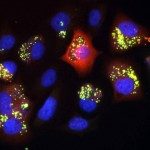Link to Pubmed [PMID] – 32129597
Link to DOI – 10.1021/acsinfecdis.9b00411
ACS Infect Dis 2020 05; 6(5): 986-999
Malaria is a tropical disease that kills about half a million people around the world annually. Enzymatic reactions within pyrimidine biosynthesis have been proven to be essential for Plasmodium proliferation. Here we report on the essentiality of the second enzymatic step of the pyrimidine biosynthesis pathway, catalyzed by aspartate transcarbamoylase (ATC). Crystallization experiments using a double mutant ofPlasmodium falciparum ATC (PfATC) revealed the importance of the mutated residues for enzyme catalysis. Subsequently, this mutant was employed in protein interference assays (PIAs), which resulted in inhibition of parasite proliferation when parasites transfected with the double mutant were cultivated in medium lacking an excess of nutrients, including aspartate. Addition of 5 or 10 mg/L of aspartate to the minimal medium restored the parasites’ normal growth rate. In vitro and whole-cell assays in the presence of the compound Torin 2 showed inhibition of specific activity and parasite growth, respectively. In silico analyses revealed the potential binding mode of Torin 2 to PfATC. Furthermore, a transgenic ATC-overexpressing cell line exhibited a 10-fold increased tolerance to Torin 2 compared with control cultures. Taken together, our results confirm the antimalarial activity of Torin 2, suggesting PfATC as a target of this drug and a promising target for the development of novel antimalarials.

